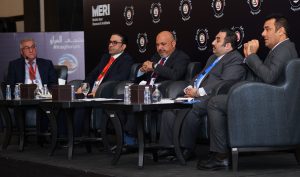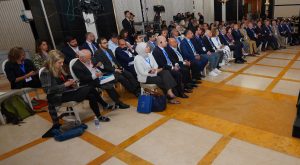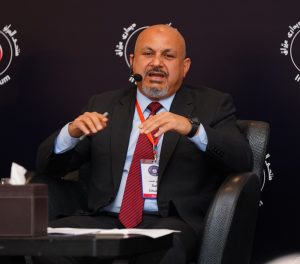- Aqeel Al-Khaz’ali, Advisor to the Prime Minister of Iraq
- Salih Dhumad, Advisor to the Prime Minister of Iraq
- Hussein Allawi, Advisor for Security Sector Reform in the Prime Minister’s Office
- Abbas Al-Amiri, Director of the Iraqi Institute for Dialogue
- Ali Nasir, Director General of the Al-Nahrain Centre for Strategic Studies (moderator)
In this session, two academic experts and three key advisors to the Prime Minister of Iraq, Mohammed Shia Al-Sudani, discussed the progress made so far by the Al-Sudani administration, over six months into office – and responded to questions on the issues the government must address to tackle the urgent pressures facing Iraq in order to meet the expectations of its people.
Prime Minister Al-Sudani has published a detailed manifesto (the Government Programme) to address challenges facing Iraq, including the security and stabilisation of the country, importance of engaging with neighbours and the international community, encouraging increased investment, reforming the financial system, diversifying the economy by reducing Iraq’s dependence on the oil sector, and improving public services, including the healthcare and education sectors. Recent months have seen steps taken to address the country’s financial crisis, seeking the stabilisation of the Iraqi Dinar, as well as efforts to improve relations with the Arab world. The Al-Sudani Administration has stressed the need to improve Baghdad-Erbil relations, particularly over Oil and Gas.

However, structural problems evidently remain – both inherited from previous administrations and inherent to the political system. The Prime Minister’s three-year budget implies a long-term vision for the country. Speakers were therefore asked to set out their hopes and vision for a more prosperous Iraq, and what to expect from the next six months and beyond. Al-Khaz’ali, who advises the prime minister on political affairs, told the audience of the crisis of institutional failure that Iraq faces, and in particular what he called “the managerial failure.” “Iraq has absented itself from the reality of institutions,” he said. “We have a problem with negligence in the institutional culture. The public sector has more than four million staff, and all of the institutions are infected with the same disease.” Al-Khaz’ali told the audience that Iraq needs to develop social institutions along the lines of countries such as Scandinavia. He summarised the government’s current key priorities as the following: more projects, better public sector services, reducing unemployment (from which, 60% of the public are suffering from, he said), supporting young people to transition to jobs and opportunities in the private sector, and protecting Iraq’s fragile economy. Regarding the oil and gas issue, he told the audience that a resolution is expected on May 10th, which is just days away. Questioned on the need for the better inclusion and involvement of women in the country’s economy, and in political decision-making processes, Al-Khaz’ali said there was already a women’s advisor.
Iraqis can take pride in the fact that the country’s healthcare and education systems used to be the best in the Middle East and among the best in the world, but it is a painful reality that mismanagement, underfunding, widespread corruption, and the lack of modern quality assurance and accreditation systems have left Iraq’s health and education systems in peril, among other public services that lag behind, including a judicial system riddled with bribery.

Dr. Salih Dhumad, who advises the Prime Minister of Iraq on health affairs, stressed the concerning figure that 90% of the country’s medicine is in some way reliant on imports. “The poor are suffering a lot, they can’t afford to seek treatment,” he told the audience. “When it comes to the country’s medicine policy, the government has depended on imports, and foreign imported merchandise.” Currently, many of these imports have increased, and this government wants to monitor the imports and have better control over the pharmacies that are importing medicine, he continued. “The other issue is the need to rehabilitate hospitals, we started with five hospitals, we are waiting for the budget to rehabilitate more than 30 hospitals. We may even reach 50 hospitals. There are over 55 hospitals that have been delayed since 2008,” he added.
Recently, the prime minister has issued instructions to follow up on the process of construction projects in the health sector, Dhumad continued. “Within six months, we have opened 12 specialist centres, with 160 beds. Another important issue we are determined to tackle is the need to register health insurance.” A pilot health insurance project is underway, he continued, and the government hopes that all Iraqi citizens will one day be part of the project. “The Ministry of Health has far too many procedures,” the health advisor added, referring to the frustrating bureaucracy Iraqis face, stressing the “rampage of corruption” as an ongoing barrier to decent health provision in Iraq. “90% of medical equipment has expired,” he said. Pressed on women’s roles and positions in Iraq in the Q&A session, Dhumad acknowledged that “they have suffered a lot,” and that better efforts are needed to allocate resources.

Dr. Hussein Allawi spoke of issues with Iraq’s security and security sector reform, on which he advises the prime minister, as well as the government’s attempts to limit and reduce blackmail in Iraq, and tackle drug smuggling. Allawi noted that there is a huge difference between rhetoric and action, and also drew attention to the 600km border along the Iraq-Syria border “and the gaps along it,” calling for national dialogue as a solution to addressing security problems. According to Dr. Abbas Al-Amiri, the Director of the Iraqi Institute for Dialogue, issues of stability and the economy will only be achieved when there is a unified approach in Iraq. “When we have a unified goal and objective, it is important to be open and work towards this,” he said, questioning when a timeline for the Oil and Gas agreement might be expected.
Iraq Forum: For Stability and Prosperity
2/05/2023
Policy Workshop 1: Six months into Government: Challenges and Progress
Session video

